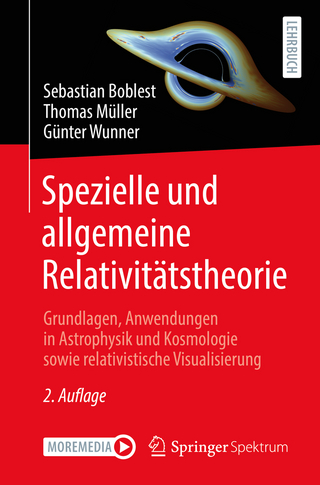Information and Self-Organization
Springer Berlin (Verlag)
978-3-540-33021-9 (ISBN)
Hermann Haken is Professor of the Institute for Theoretical Physics at the University of Stuttgart. He is known as the founder of synergetics. His research has been in nonlinear optics (in particular laser physics), solid state physics, statistical physics, and group theory. After the implementation of the first laser in 1960, Professor Haken developed his institute to an international center for laser theory. The interpretation of the laser principles as self organization of non equilibrium systems paved the way to the development of synergetics, of which Haken is recognized as the founder. Hermann Haken has been visiting professor or guest scientist in England, France, Japan, USA, Russia, and China. He is the author of some 23 textbooks and monographs that cover an impressive number of topics from laser physics to synergetics, and editor of a book series in synergetics. For his pathbreaking work and his influence on academic research, he has been awarded many-times. Among others, he is member of the Order "Pour le merite" and received the Max Planck Medal in 1990.
The Challenge of Complex Systems.- From the Microscopic to the Macroscopic World ....- ... and Back Again: The Maximum Information Principle (MIP).- An Example from Physics: Thermodynamics.- Application of the Maximum Information Principle to Self-Organizing Systems.- The Maximum Information Principle for Nonequilibrium Phase Transitions: Determination of Order Parameters, Enslaved Modes, and Emerging Patterns.- Information, Information Gain, and Efficiency of Self-Organizing Systems Close to Their Instability Points.- Direct Determination of Lagrange Multipliers.- Unbiased Modeling of Stochastic Processes: How to Guess Path Integrals, Fokker-Planck Equations and Langevin-Îto Equations.- Application to Some Physical Systems.- Transitions Between Behavioral Patterns in Biology. An Example: Hand Movements.- Pattern Recognition. Unbiased Guesses of Processes: Explicit Determination of Lagrange Multipliers.- Information Compression in Cognition: The Interplay between Shannon and Semantic Information.- Quantum Systems.- Quantum Information.- Quantum Computation.- Concluding Remarks and Outlook.
From the reviews of the third edition:
"This enlarged edition of Information and Self-Organization addresses the concept of information in depth: ranging 'from Shannon information, from which all semantics has been exorcised, to the effects of information on receivers and the self-creation of meaning'-that is, toward semantic information ... . Nevertheless, both the qualitative lessons and quantitative analysis presented in the book ... very useful for artificial life researchers." (Mikhail Prokopenko, Artificial Life, Vol. 15, 2009)
| Erscheint lt. Verlag | 26.6.2006 |
|---|---|
| Reihe/Serie | Springer Series in Synergetics |
| Zusatzinfo | XIV, 258 p. |
| Verlagsort | Berlin |
| Sprache | englisch |
| Maße | 155 x 235 mm |
| Gewicht | 524 g |
| Themenwelt | Naturwissenschaften ► Physik / Astronomie ► Astronomie / Astrophysik |
| Naturwissenschaften ► Physik / Astronomie ► Theoretische Physik | |
| Naturwissenschaften ► Physik / Astronomie ► Thermodynamik | |
| Schlagworte | chaos theory • Cognition • Complex System • Complex Systems • Entropy • Helium-Atom-Streuung • Information • Information Theory • Quantum information • REM • Selbstorganisation • Self-Organisation • Shannon • stem • Synergetics • Synergetik • thermodynamics |
| ISBN-10 | 3-540-33021-6 / 3540330216 |
| ISBN-13 | 978-3-540-33021-9 / 9783540330219 |
| Zustand | Neuware |
| Haben Sie eine Frage zum Produkt? |
aus dem Bereich




